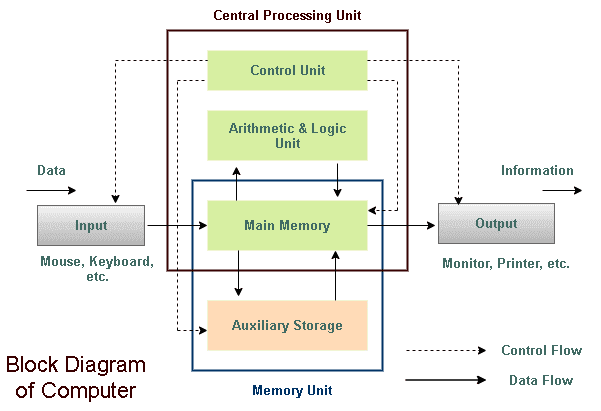Fundamental of Computing( A01 and A02)
Basic Structure Of Computer
Input: Any information or data that is sent to a computer for processing
Processing: It is the manipulation of data, usually by a computer program inorder to transform it into information.
Output : Any information processed by and sent out from a computer or other electronic devices.
Storage components:Storage of the computer is directly proportional to its performance. Meaning more the storage, better the performance.
two main types of storage:
1. Short term storage ( volatile ): Random access memory (RAM) also known as working storage.
In shortage of RAM to run a program, computer will used the disk
drive to supplement ( virtual memory )
2. Long term storage(non volatile):accessible even in absence of power.
eg: hard disk, CDs/DVDs and USB flash drives.
Four major components of computer hard drives
1. Motherboard
2. Hard drives
3. RAM
4. BIOS/ CMOS( basic input / output system)
Three Computer Bus Fundamental
1. Data Bus
2. Adress Bus
3. Control Bus
Difference between I/O of polling and interrupt
- Polling is the process where the computer waits for an external device to check for its state where as Interrupt is the process of data transfer in which external device informs the CPU that it is ready and request for its attention.
- In case of occurance, polling occurs at regular intervals where as Interrupt can occur at any time.
Hard drives: is primary long-term storage component in computer. It stores documents, application etc.
Solid state Drives: it is used in place of hard drives and quite expensive.
Computer has to be connected to network inorder to access internet.
Central Processing Unit(CPU): is the heart of Computer.
Computer Boot Procedure
- Step 1: BIOS is loaded. The first step involves turning on the power.
- Step 2: BIOS: Power on Self-Test.
- Step 3: Loading of OS.
- Step 4: System Configuration.
- Step 5: Loading System Utilities.
- Step 6: User Authentication.
Topic: Fetch, execution, Input and Output
Computer processing unit: consists of arithmetic and logic unit, a control unit and various registers.
It is also known as processor.
Data must be stored in the Functionals unit of primary memory (main memory) to be executed.
Cache memory is smaller and faster then main memory.
In the ALU processor, majority of computer operations are executed. And operation of these units is coordinated by Control unit.
Instruction cycle is the cycle that the central processing unit follows from boot-up until the computer is shut down.
Steps for instruction cycle: fetch instruction
Decode
perform ALU operation
Read adress
Execute
Three types of instruction
- Load
- Store
- Operate
Processor Component: It enables our computer to interact with all of the applications and programs installed. It also interprets the program's instructions and creates the output for it.
The program counter holds the memory adress of the next instruction that would be executed where as,
Instruction register holds the current instruction.
The program counter helps in faster execution of task as well as for tracking the current execution point.
More over, these application program can handle input and output devices. It can read (key board character) and write ( letter character ) to operate.
performance of the program can be affected by fastness of electronic circuits, access time, instruction set and number of operation at the same time (parallelism).









Comments
Post a Comment